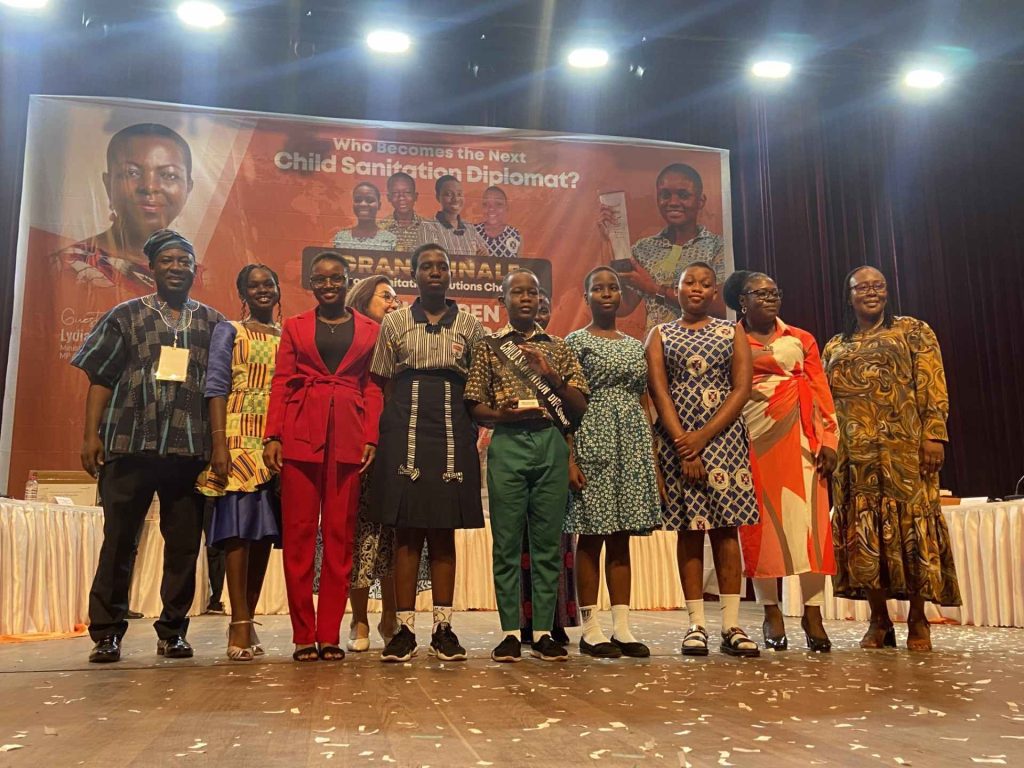|
Getting your Trinity Audio player ready...
|
Fourteen-year-old Abdul Yazid Faraj Timotoni Wumbei of the Grace Holy Child Academy in Tamale, has on Monday been declared Child Sanitation Diplomat for 2024/2025 by World Vision Ghana (WVG) a child focused humanitarian organisation, and some of its partners.
He came out on top, with 55 points, and a difference of one for the first runner-up, Esi Abakah Owusu, of University Junior High School, Cape Coast, and two other finalists in the hotly contested grand finale of this year’s Schools Sanitation Challenge (Triple S) competition, held at the National Theatre in Accra.
As Faraj was pronounced winner at final of finals stage, called the Battle of Champions, and invited to be crowned, a fountain of flames of light spewed from the base of the stage, and from the backstage, and camera apertures clicked, with buoyous music in the background to capture the laureate who had beaten thousands of contests from across Ghana to be crowned diplomat.
Aside from being presented with a cash prize of GHC 6,000 the smile-wearing laureate was also given a laptop, a plaque, and certificate among other prizes; and was decorated with a sash by Adjoa Gyakoa Appiah-Kubi, the out-going Child Sanitation Diplomat.
Faraj would also be supported to implement a one-year project on environmental sanitation, and would take part in local environmental sanitation conferences, and foreign ones when opportunities and funds would be available.
Winning this year’s contestant, Faraj is the first male pupil to have won the contest since it began five years ago.
The second and third runners up were Candy Nana Adwoa Okwan of Achimota Basic School in the Greater Accra Region and Christiana Sefakor Sedenkor of Presby “E” Basic School, Koforidua, respectively.
The organisers introduced the contest, now at three stages, in the year 2020, and, as an initiative developed through the WVG and Kings Hall Media, to encourage children to cultivate keen interest in issues of environmental sanitation, influence children to co-create sustainable solutions to sanitation challenges, and to empower children to advocate the removal of barriers and increase access to improved sanitation, especially in Basic Schools.
Madam Lydia Seyram Alhassan, Minister for Sanitation and Water Resources, in a keynote address read for her by Mrs. Jennifer Buabeng, Director of General Administration at the Ministry, said environmental sanitation is a pressing developmental issue in Ghana,
She underscored environmental sanitation as an indicator of development.
She stressed: “Let’s not forget sanitation as shared responsibility,” and called on all to get on board in the sanitation drive, rather than only holding only children responsible for environmental sanitation.
The Minister recognised the contribution of stakeholders in the national sanitation drive and pledged the commitment of the Ministry to ensure the best delivery of wash services.
The Minister asked: “What else can we do to make this country more beautiful than when we came to meet it?
Madam Laura Del Valle, National Director of WVG, regretted that there was a lack of access to safe water and toilet facilities, especially when many schools did not also have access to changing rooms for girls.
“This does not make the school environment conducive or friendly to the girl child, particularly those who have reached the age of puberty,” she noted.
Madam Del Valle called for more collaboration among stakeholders in water, sanitation and hygiene for sustainable access to improved sanitation.
Outgoing Child Sanitation Diplomat Adjoa Gyakoa, gave an overview of sanitation activities during her reign and urged the government to pay more attention and prioritise water and sanitation and changing rooms in public Basic Schools.
She reiterated her proposal to the Ministry of Education to fashion out a policy for every child to pay GHC 1 towards the provision and maintenance of WASH facilities.
Mr. Harold Essseku, Senior Water Supply and Sanitation Specialist at Ghana Office of the World Bank, identified water as” life and sanitation as dignity,” stressing sanitation to prevent disease for good quality life.
The excited winner, in an interview with journalists, pledged applauded the organisers for creating a platform for young ones to actively engage in sanitation activities.
He promised to influence his peers to engage in activities that improve sanitation.
Source: GNA


